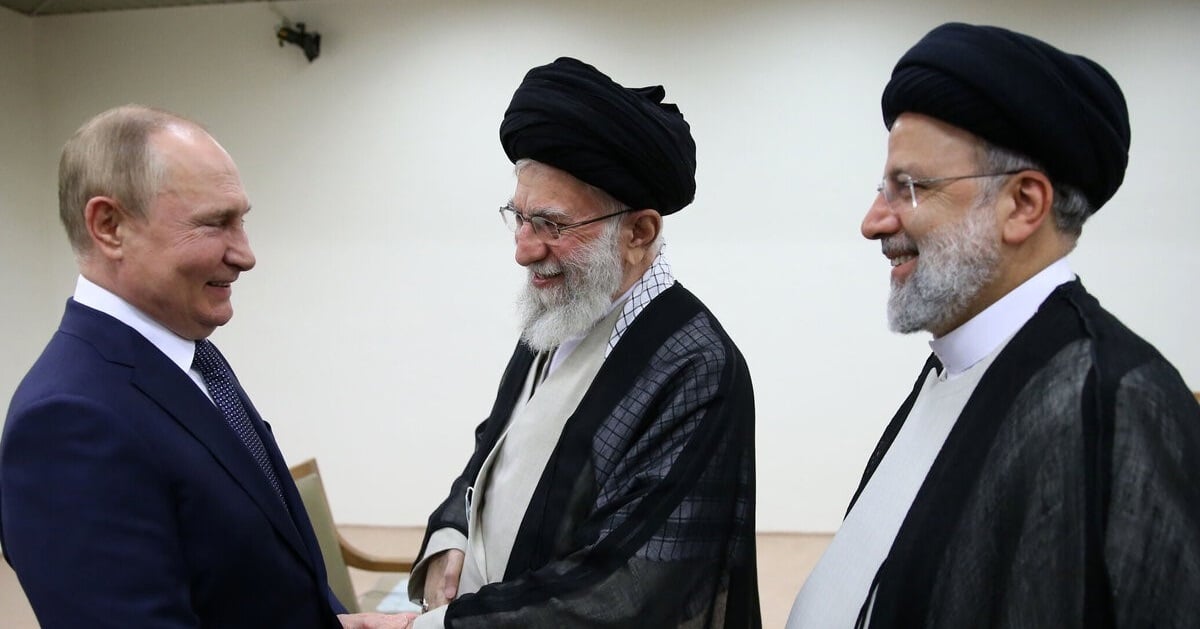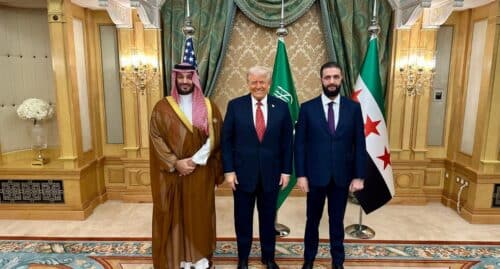The views expressed in this article are those of the author and do not necessarily represent the views of the movement.
Iranian support for Russia increases Western frustration with Iran, but so far the West has avoided significant changes in its attitude toward Iran and its nuclear program, thereby creating a problematic de facto arrangement with Tehran.
The military aid Iran provides to Russia in its war against Ukraine, mainly through the supply of Shahed 136 UAVs (Unmanned Aerial Vehicles), effectively places Iran, despite its efforts to deny this, as a party to the war. As a result, the US administration stated that “Iran may be complicit in war crimes,” and after it became clear that the production of Iranian drones is based on parts produced in Western countries, including the US itself, the administration decided to take steps that would make it difficult for Iran to manufacture these aircraft. The rest of the Western countries were reacting merely with condemnations.

Western outrage against Iran recently stems both from its contribution to Russian attacks on civilian targets deep inside Ukraine and from the brutal suppression of demonstrations that have been ongoing for more than three months demanding greater freedom for Iranian citizens. These demands are interpreted by the Ayatollah regime, and with a great deal of justice, as a call to overthrow it. This is based not only on the explicit demand of many of the demonstrators and their supporters around the world, but also because, as an extremist Islamist regime, it understands that any substantive compromise it makes to please the public will be interpreted as weakness, will require a change in the nature of the regime, and will exacerbate the threat to its survival.
The harsh hand shown by the regime, which is reflected in the executions of supporters of the protests, is criticized by the West, and some Western countries intend to impose sanctions against the leaders of the oppression (in the US and Canada, sanctions have been imposed on some of them, and the UK is considering designating the Revolutionary Guards as a terrorist organization), but no country has stood behind the demonstrators’ demands for regime change and has not taken substantive measures against the Iranian regime.
The Nuclear Deal is dead, but admitting it would imply admitting failure and search for alternatives
Western frustration with Iran is also fueled by its policy on the nuclear issue. The Iranians continue to prevent the International Atomic Energy Agency (IAEA) from monitoring their nuclear activities, accumulate highly-enriched uranium in full force, including to 60%, in a way that allows them to enrich enough uranium to the level required to produce a number of nuclear explosive devices within a few weeks. They continue to condition the return to the nuclear agreement on the IAEA’s waiver of its demand for information about the nuclear facilities exposed in the Nuclear Archive that Israeli Mossad obtained in Tehran, and increase uranium enrichment at the deep underground facility at Fordow.
The feeling in the West, and particularly in the US, against this backdrop, is that the chances of a return to the nuclear deal (the JCPOA) are close to zero, but as President Biden told an American of Iranian descent whom he met randomly during the congressional election campaign, “the agreement is dead, but Washington will not announce it for a variety of reasons.” It seems that the main reasons for this are that the administration is still hoping for a return to the agreement and is determined to maintain this option, and fears that announcing the death of the agreement will be a consideration in the Iranian decision-making process regarding a forward breakout towards a nuclear bomb. Iran is now preparing vigorously for the possibility of a breakout, but refraining from its implementation, thereby freeing the administration from the need to invest resources in deterring it, at a time when most of its attention is directed to other issues.
Announcing the death of the agreement would be an admission of failure and would damage the legacy of the Obama and Biden administrations, and would require Biden, against his will, to point to an alternative way to deal with the Iranian nuclear threat, centering on increasing pressure on Tehran and presenting a credible military option to deter the Iranians from breaking forward instead of the diplomatic channel. In addition, the Americans, like Israel, estimate that if Iran tries to break through to nuclear weapons, it will need a relatively long period of time (about two years) to turn the enriched material into a bomb, and therefore the US (and Israel) will have enough time to act and ensure that the Iranian nuclear project is thwarted, and thus the US will be able to meet its commitment not to allow Iran to obtain nuclear weapons.
In other words, not only has the administration not changed its approach to Iran despite its practical standing with Russia in the war in Ukraine, the suppression of the demonstrators, its continued dangerous activity in the nuclear sphere, Iran’s continued support for extremist terrorist elements and its proxies in the Middle East, its support for anti-Semitism, and its commitment to harm Israel. In practice, it is coming to terms with a reality in which Iran will continue with all these policy elements, including establishing its ability to break out towards military nuclear capability, without a real American response, as long as it does not realize this capability, for example by enriching uranium to a military level (90% or more). At this stage, it seems that the Iranians, who are facing weighty challenges at home (demonstrations and the economy) and abroad, are certainly willing to play their part in this arrangement, which allows them to act in all these areas to advance their goals without fear of paying a significant price.
Risks for Israel: Arrangement with the West, rapprochement with Russia
In the Israeli context, the emerging reality vis-à-vis Iran presents quite a few risks, but also several opportunities. The main risk is that Iran can take advantage of the emerging arrangement to continue entrenching itself in the nuclear threshold area. They are already very far from what Israel described in the past as a red line (250 kg of uranium enriched to 20%), and as they produce and operate more and more advanced centrifuges and accumulate more enriched uranium to levels of 60% and 20%, the greater the temptation to break into a military nuclear program and their ability to do so.
Another risk connecting the Ukrainian issue to the nuclear issue has to do with the rewards that Russia is already giving Iran for its aid and other possible changes in the future. The transfer of advanced air defense systems, the supply of advanced Russian aircraft (Sukhoi-35), and extensive assistance to the Iranian military industry to increase the production of drones and missiles will make it difficult for Israel to operate against Iran in certain configurations and improve its ability to attack Israel. The monetary reward for Iranian aid can also ease the pressure exerted on the regime.
Even worse, if the Russians accede to a possible request by Iran to help, even if only by turning a blind eye, in shortening the time required to turn enriched uranium into nuclear weapons, the entire system of assumptions underlying the new and very problematic arrangement in itself will be undermined.
Another possible area of concern for Israel is a change in Russia’s policy regarding IAF strikes against Iranian targets in Syria. So far, Russia has refrained from damaging the coordination mechanism intended to ensure that there is no friction between Israeli and Russian planes in Syrian airspace. It is likely that this policy will remain in effect for the future, in part as leverage to ensure that Israel does not change its position on the question of military aid to Ukraine, but the Iranians may urge the Russians to adopt a more aggressive approach towards Israel in this regard.
Opportunities for Israel: Iranian international isolation and rapprochement to the West and the Arab World
In the face of the risks, as noted, Iranian assistance to Russia also presents opportunities. First, it provides Israel with a significant reinforcement of its just claim that the West must take a much more resolute stance against the Islamic regime in Iran, because it is committed to the struggle against the existing World Order and joins the two main threats to that order – Russia and China. In one aspect, the Iranian threat is even more serious than the others, since it does not focus only on the struggle between the major forces in the international system for assets and power (Great Power Competition in international parlance), but is based on a sense of universal and dangerous religious ideological mission, and jeopardizes Western interests in the Middle East, an important source of energy for the West. Iran is clearly not an Israeli problem, but a threat with global implications, as Israel has long argued.
In the same context, recognition of the severity of the Iranian threat can translate both into increased military and intelligence cooperation with Iran between the US and Israel, as well as increased strategic coordination between Israel, Western countries, and pragmatic Arab countries vis-à-vis the Iranian threat. An substantial manifestation of this trend may be progress in the expansion of the Abraham Accords, especially by the gradual normalization of relations with Saudi Arabia.
As noted, the new arrangement is problematic, and Israel must prepare to deal with its dangerous consequences, especially in the nuclear sphere, while at the same time making the most of the opportunities inherent in it for more significant cooperation with the US and the Sunni states threatened by Iran.




